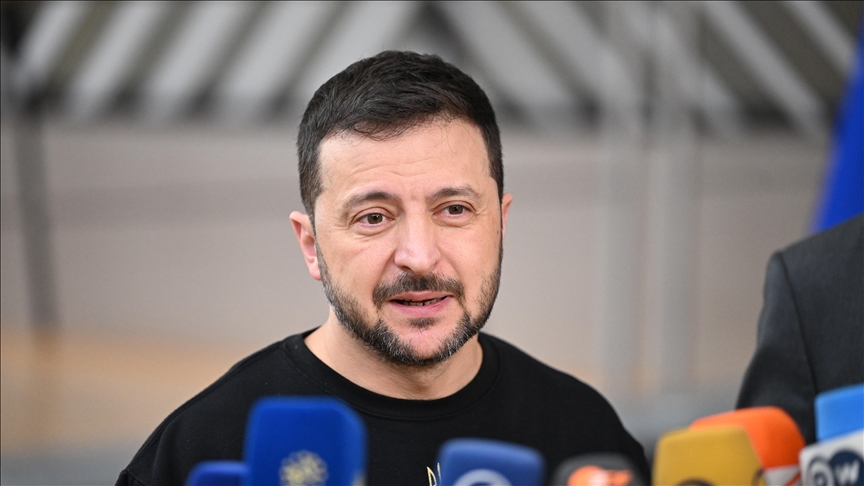Zelenskyy claims North Korean soldiers 'fleeing' frontline in Russia's Kursk region
Ukrainian president highlights incursion into Kursk region, alleged Russian losses, London's continued support in talks with UK foreign secretary

ISTANBUL
Ukrainian President Volodymyr Zelenskyy claimed that North Korean soldiers are "fleeing" the frontline in Russia's border region of Kursk, where Kyiv launched an incursion just six months ago.
“The Russians suffer really large losses there. They are greatly underestimating them. Their Koreans (North Korean troops) are fleeing, we see it,” Zelenskyy told journalists late Wednesday following talks with visiting UK Foreign Secretary David Lammy in Kyiv.
Speaking about Ukraine's incursion into the Kursk region, which began last August, Zelenskyy defined the "operation" as a "very important step" that may become important once the conflict in the country reaches the diplomatic stage.
"I do not like to throw around words like ‘historical’. After all, Ukraine’s whole life and struggle is certainly a historical path, so I won’t be throwing around this word regarding the operation. But it was definitely very important," he said.
Zelenskyy further said that Ukrainian forces in Kursk are "keeping the situation stable, and will continue to do so," highlighting several important targets in the Kursk region were hit using long-range weapons.
"These are very serious steps. They are important. And I think they won’t be able to push us out of that territory anytime soon, and this, like a magnet, keeps 60,000 of their soldiers in this area today," Zelenskyy went on to say.
He added that the ongoing incursion in the Kursk region enabled them to stabilize the situation in Ukraine's neighboring Kharkiv region, where Russia has claimed advances amid its ongoing offensive in eastern Ukraine.
Kyiv's incursion into the Kursk region began on the night of Aug. 5-6, when Ukrainian forces entered near the town of Sudzha, approximately 10 kilometers (6.2 miles) from the border.
Russian President Vladimir Putin condemned the incursion as a “large-scale provocation” and an act of “indiscriminate shooting,” characterizing it as a “terrorist attack.”
In response, Ukrainian President Volodymyr Zelenskyy later confirmed that the incursion aimed to create a “buffer zone” to protect against cross-border attacks from Russia.
Ukrainian and Western reports claim the presence of about 12,000 North Korean soldiers in the Kursk region.
Russia and North Korea have boosted their military ties in recent years, but have not confirmed if Pyongyang's forces are fighting for Moscow.
A report on Tuesday by the Seoul-based Yonhap News agency, citing South Korea's National Intelligence Service, said that North Korean troops deployed in Russia appear to have been absent from the frontline in Kursk since mid-January.
The Russian and North Korean officials have yet to respond to Zelenskyy's latest remarks.
- UK’s support for Ukraine
Earlier, Zelenskyy and Lammy held talks during which the Ukrainian president thanked the UK for all of its defense, financial, humanitarian and political support for Kyiv since the start of the conflict, which is set to enter its fourth year later this month.
“We are grateful to you, Prime Minister (Keir) Starmer and his government. In particular, for his visit to us and for signing a very important, historic one-hundred-year agreement on partnership in various sectors,” Zelenskyy was quoted as saying in a presidential statement.
The statement said that Zelenskyy and Lammy particularly discussed the implementation of the "100-Year Partnership" agreement signed in January between the two countries, as well as other forms of support at the bilateral and multilateral levels.
It further said that Zelenskyy welcomed the UK's allocation of £2 billion in financial aid for developing Ukraine's defense production, and that the two discussed the coordination of efforts with partners and security guarantees as well.
They also had a detailed discussion on intensifying sanctions against Russia, particularly on its oil and defense industries, as well as using frozen Russian assets for Ukraine's benefit.
For his part, Lammy reaffirmed that the UK remains committed to supporting Ukraine. “Our assessment is that (Russian President Vladimir) Putin does not want to conduct any negotiations now. Therefore, we continue to help you as much as we can as you fight this terrible war, and we encourage other partners to do the same.”
The UK foreign secretary arrived in Kyiv on Wednesday as part of an official visit, less than a month after the two countries signed the “100-Year Partnership” agreement during British Prime Minister Keir Starmer’s visit to the Ukrainian capital on Jan. 16.








